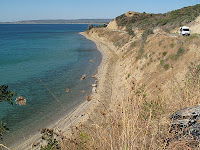We had intended to cross the Sea of Marmara and spend a few nights at a marina just outside Istanbul. But each day brought 20- 25 knot winds on the nose and 3 knots of current against us. We were through the Dardanelles but decided that this was no fun at all!
Instead we spent two nights in the harbour at Canakkale (at the narrows in the Dardanelles) and took a six hour tour to the Gallipoli site in the company of 24 Aussies, 2 Kiwis and 1 young Japanese guy! It was really quite a moving experience and we had an excellent Turkish guide who told horrifying stories of "trench warfare". It was unclear to us whether or not there had been a tactical error in landing at the wrong beach. To have landed on Brighton Beach, the Turkish guns would have had to have been taken out, which would have meant shelling from the Allied ships, which would have alerted the Turkish ground forces who were occupying the high ground. This would have given away the element of surprise. What was clear was that the overall operation suffered from inadequate planning through a lack of detailed information . It was a tragic loss of life, and I guess that if the Allies had achieved their objective, there would have been even more fatalities.
"Anzac Cove" is just a tiny bay and yet thousands upon thousands of ANZAC troops landed there and set up their base for the supplies to the trenches. A small boat took us along the shore into Anzac Cove above the remains of the hull of a landing vessel and then we "coach hopped" to each of thecemeteries and memorial sites, sometimes walking along the trenches. It's
said that each Turkish family lost at least one family member during those eight and a half months, the Turkish casualties were so high and their artillery so limited. What was particularly moving was the piece included in Attaturk's speech in 1932 when he referred to the
countless numbers of the Allies' lost young lives buried on Turkish soil, "....your sons are our sons'.
said that each Turkish family lost at least one family member during those eight and a half months, the Turkish casualties were so high and their artillery so limited. What was particularly moving was the piece included in Attaturk's speech in 1932 when he referred to the
countless numbers of the Allies' lost young lives buried on Turkish soil, "....your sons are our sons'.










No comments:
Post a Comment